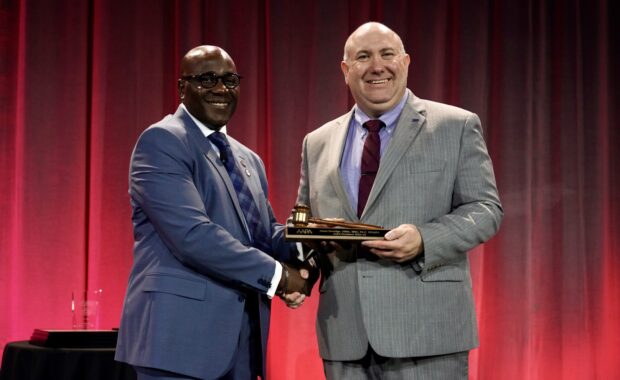How AAPA’s Online Community Helped Save My Patient’s Life
Huddle Provides Solution for Patient with Addiction
August 2, 2018
By Richard Bottner, PA-C
I will begin with the end: if I were not a member of AAPA and an active participant on Huddle, my patient would be dead.

I have been part of the AAPA Huddle online member community since its beginning three years ago. For the most part, I stay on the sidelines but thoroughly enjoy reading through the Daily Digest emails.
I work in hospital medicine and am passionate about palliative care. Ordering opioids is a relatively large part of my practice. Last October, Huddle hosted an “Ask Me” session on Addiction Medicine with James Anderson, PA-C, MPAS, DFAAPA, a fellow PA who works in addiction medicine. In reading through the digest, I noticed a question asked by a colleague regarding the association between appropriately prescribed opioids and addiction. This piqued my interest, and I followed the rest of the thread closely. James suggested that anyone who prescribes opioids should consider taking the x-waiver class for buprenorphine, if for no other reason than to learn more about the severity of the epidemic and possible solutions. This resonated with me, so I began the online course.
A few weeks later, I received an email from the Society of Hospital Medicine sharing information about California SHOUT, a program designed for California hospitalists to encourage buprenorphine therapy on medical wards. Given the x-waiver course that I had just started, I signed up for that resource as well. Both the x-waiver course and the SHOUT program shared a common theme: the opioid epidemic is pervasive and all providers, including hospitalists, could play a role in offering treatments and reducing stigma.
Then I paused.
I work at a community hospital. I know that many of my patients suffer from opioid use disorder (OUD), but our only resource, other than treating acute withdrawal, was providing them with a one-pager of outside agencies that could support them after discharge. While they were inpatient, we had little to offer for this chronic disease. Many of these vulnerable patients were often mislabeled “as just another opioid abuser” by some staff, including me. I ran the data, and, as it turned out, we had many patients in a 12-month period admitted to the hospital with OUD.
Ironically, around the same time that I was reading about OUD on Huddle, starting the x-waiver course, and learning about the SHOUT program, the PA Foundation announced a grant application for behavioral health, which we ultimately received and used to start the B-Team. Editor’s note: The PA Foundation grant was the National Institute of Drug Abuse (NIDA) Mentored Outreach Award.
The B-Team is a multidisciplinary and interprofessional consult service that works to offer buprenorphine inductions in the hospital setting. Our team has over 50 stakeholders from multiple agencies. While buprenorphine inductions happen in other hospitals across the country, we have not found any formal programs that train internists to do this work and build partnerships with non-affiliated/non-hospital-owned outpatient clinics.
Enter my patient: a 40-year-old male who had been in and out of prisons for over 20 years because of opioid addiction. He was admitted for his THIRD episode of endocarditis and was supposed to be on the ward for six weeks to complete IV antibiotics. At one point, he left the hospital and used heroin on the street. When he came back, the hospital staff wanted to discharge him against medical advice. When our team was called to see him, he was pacing back and forth. Extremely nervous. Screaming at nurses. Tearful. Agitated. He kept repeating “I need a fix. I’m just going to leave. I can’t stay.” Our team started the buprenorphine and he made an incredibly positive turnaround in just a few short days. He was upbeat. Thinking about his future. Listening to music. Talking with us about his troubled past. Wanting to do better for himself and his fiancé.
Based on his comorbidities, if he had left without completing therapy, I am positive he would not have made it. A note that we received from the follow-up clinic read in part “…he became quite emotional, started crying to the point where he could not talk and expressed a lot of gratitude for everything you all have provided for him. More importantly, it really seemed to be about his feelings, and almost disbelief, that ‘they actually really care about me.’ It was kind of heartbreaking, but very awesome that you all have made such an impact.”
The B-Team has been impactful personally and professionally. Most importantly, through our induction process and educational stigma reduction efforts in the hospital, we are helping a patient population which I now fully recognize as having been underserved for far too long. I am also incredibly excited about the visibility that this PA-led program has had for our profession, and for PAs to be viewed not only as awesome clinicians, but also impactful community leaders.
And it all started on Huddle!
Thanks to everyone who has spent the last three years building this great community. Even for those who don’t post frequently, like me, it is a tremendous resource.
Happy Birthday, Huddle!!
AAPA Note:
PAs and NPs were granted the ability to obtain waivers to treat substance use disorder patients with buprenorphine through October 2021 as part of the Comprehensive Addiction and Recovery Act (CARA) in 2016. Since the enactment of CARA, more than 5,000 PAs and NPs have gone through the required training and applied for the waiver—allowing them to provide this life-saving treatment.
The Senate is now considering bipartisan legislation that would make this waiver authorization permanent for PAs and NPs. Earlier this year, the House passed legislation with the same provision. Ask your senators to support comprehensive legislation addressing the opioid epidemic that makes permanent the ability of PAs to prescribe buprenorphine.
More Resources
Read the article about the Addiction Medicine Ask Me Session here.
Apply for a PA Foundation NIDA Mentored Outreach Award in Substance Abuse Disorders Treatment Dissemination
AAPA Huddle Ask Me Session Archive
Richard Bottner, PA-C, is a hospitalist with the Division of Hospital Medicine at Dell Seton Medical Center and a Clinical Assistant Professor of Internal Medicine at Dell Medical School at The University of Texas at Austin. Contact him at [email protected].
Thank you for reading AAPA’s News Central
You have 2 articles left this month. Create a free account to read more stories, or become a member for more access to exclusive benefits! Already have an account? Log in.



